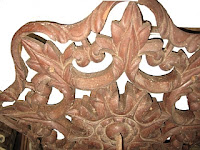Music of Decay
Last night I dreamt I went back to the old tamarind tree in the bend of Jalan Kolam, and this is what I saw:
 Broken bits of gamelan tunes blew in with occasional sweeps of the wind, sad lamentation of times past reaching out to the here and now, Pök Mat Nöbat in his younger days, stooping in his later years to re-beat the tunes on the gamelan Trengganu; it was there that the first notes of the Trengganu state anthem were sung before the Sultan Sulaiman, by students picked from the nearby Sekolah Paya Bunga; the scholar-saint Haji Abdul Rahman Limbong was summoned there when the peasants took up arms in the ulu (but it is not clear if the man did go); and here the gamelan instruments were lost and found, and then revived when Pök Mat was summoned from the side of his cauldron of nasi minyök in his shed and shop, with his coterie of ageing courtiers, to channel the music that was playing in their heads for so long once more, back into the gamelan glockenspiel. How this fine old istana went into neglect and disrepair remains a mystery.
Broken bits of gamelan tunes blew in with occasional sweeps of the wind, sad lamentation of times past reaching out to the here and now, Pök Mat Nöbat in his younger days, stooping in his later years to re-beat the tunes on the gamelan Trengganu; it was there that the first notes of the Trengganu state anthem were sung before the Sultan Sulaiman, by students picked from the nearby Sekolah Paya Bunga; the scholar-saint Haji Abdul Rahman Limbong was summoned there when the peasants took up arms in the ulu (but it is not clear if the man did go); and here the gamelan instruments were lost and found, and then revived when Pök Mat was summoned from the side of his cauldron of nasi minyök in his shed and shop, with his coterie of ageing courtiers, to channel the music that was playing in their heads for so long once more, back into the gamelan glockenspiel. How this fine old istana went into neglect and disrepair remains a mystery.Like the face of clocks, floppy, curled and clinging to the ledge and branch of a dead tree in Dali's Persistence of Time, melancholy hangs here in deep shadows and its movements watched by ghostly eyes peering through dusty panes of closed windows — at patches gone grey in the earth and grass untrimmed and gone to seed in the soil; distant leaves of the keladi fringing this sad, haunting decay. "What does it all mean?" someone asked of Magritte, of his paintings that were hard to fathom. "It does not mean anything, because mystery means nothing either, it is unknowable," replied the old master.
This is the sad end-note to the Istana Kolam, one of the surviving istana of wood in Kuala Trengganu, in Kampung Kolam. I used to see its balai through a gap in the fence in the bend of the road when we walked from Kampung Tanjong to the Masjid Putih, past the huge, ghostly tamarind tree, past the house of Mr Isaacs of the Grammar School, past the quaint old-style house of Pak Long who made ma'ajun (a pastille of herbs and stuff for the weary male), and then the shop of a kindly man named Babu of the Paul family on the right side of the road, and a huge house stood across from there, at the junction of two roads, home of Che Mat Riau, another illustrious character of Kuala Trengganu.

 It is sadder still now, for even the above is no more. A friend once wrote to me to say that he saw bits and parts of the Istana Kolam laid out in a car boot sale. Now, another friend has sent me this picture of what appears to be the 'ceiling rose' [see picture, above] in the old istana. What light that shone from there is probably now dimmed out in some ghostly corner, snuggling with the spirits and the sounds of old Trengganu.
It is sadder still now, for even the above is no more. A friend once wrote to me to say that he saw bits and parts of the Istana Kolam laid out in a car boot sale. Now, another friend has sent me this picture of what appears to be the 'ceiling rose' [see picture, above] in the old istana. What light that shone from there is probably now dimmed out in some ghostly corner, snuggling with the spirits and the sounds of old Trengganu.Now they are planning to re-build the Istana Kolam in another place, in Duyung probably. Duyung is a farway place across the water with its own niche and history, but it is here that the old istana should be rebuilt as a heritage centre. The authorities should reclaim this land, and rebuild it here, and return the Istana Kolam to its own soil.
See also:
Singing for the Sultan
Music in the Rubble
Man at the Istana
GUiT at the Singapore Writers Festival  If you are in London, Growing Up in Trengganu is now available from Stanfords, the travel bookshop in Long Acre, Covent Garden and from Probsthain's @ Great Russell St., WC1 (opp. the British Museum; see picture, left) and at their branch in the Brunei Gallery, SOAS (London University). If you are in London, Growing Up in Trengganu is now available from Stanfords, the travel bookshop in Long Acre, Covent Garden and from Probsthain's @ Great Russell St., WC1 (opp. the British Museum; see picture, left) and at their branch in the Brunei Gallery, SOAS (London University).Latest News: In Kuala Terengganu GUiT is now available @ the shop formerly known as Keda Pök Löh Yunang (now Alam Akademik, 12 Jalan Bandar, Kuala Terengganu). In Kuala Lumpur: Kinokuniya, Times bookshops, and MPH. Elsewhere: You may place your order on-line from Kinokuniya or MPH "A beautiful book, very well written and with its vignettes of life it tells so much about the Malays - far more than one can get from academic studies." — Frederick Lees, author, Fool's Gold; The Arthuriad; The Rape of Rye; etc. |
Labels: Babu, Che Mat Riau, Isaacs, Istana Kolam


